| |
ASPHALT JUNGLE
Electro Ave.
(ROIR)
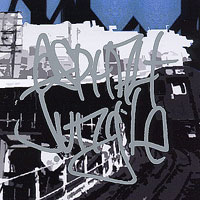 Guitarist
Brian Tarquin has
his fingers right on the pulse of the current music scene. Kicking off
his career in a big way back in his native NYC during the early ‘90s,
Tarquin began composing music for jingles and commercials. Moving to
L.A. back in ‘92, Tarquin expanded his career in the music biz—which
by now encompassed the roles of recording artist, session guitarist,
jingle writer and recording engineer. Between 1996 and 2001 the guitarist
recorded four solo albums of smooth-as-silk, guitar-based instrumental
acid jazz for MCA and NYC-based Instinct Records. By 2001 Tarquin needed
to flex his musical muscles and—joining together with his creative
partner / keyboardist and programmer Chris Ingram—the end result
is his 2002 CD Electro Ave. featuring his latest outfit, Asphalt
Jungle. Described as ‘a groundbreaking album where techno meets
rock head on’, Electro Ave.—released on the NYC-based
ROIR imprint—blends
the best elements of Tarquin’s guitar-jazz prowess and really revs
things up with a round of ultra heavy drum and bass tracks, freaky loops
and electronic samples. Inspired by the early ‘90s London acid
jazz scene and British electronica revolution, Electro Ave. is
one of the heaviest, most sonically intense, guitar-based instrumental
albums of the past few years. Drawing on Tarquin’s flair for composing
film and TV music, Electro Ave. simmers in a stew of vivid dance
and electronica grooves, with the guitar smack dab in the center of
the sonic storm. Inventing a high-tech guitar sound for the new century
is no mean feat, but clearly Brian Tarquin has the guts and determination
to give it his best shot. In this interview Brian Tarquin discusses
Electro Ave., his career as a soundtrack and TV music composer,
his extensive guitar collection and his musical influences. The following
interview took place over the internet and by phone August 20 &
21, 2002. Guitarist
Brian Tarquin has
his fingers right on the pulse of the current music scene. Kicking off
his career in a big way back in his native NYC during the early ‘90s,
Tarquin began composing music for jingles and commercials. Moving to
L.A. back in ‘92, Tarquin expanded his career in the music biz—which
by now encompassed the roles of recording artist, session guitarist,
jingle writer and recording engineer. Between 1996 and 2001 the guitarist
recorded four solo albums of smooth-as-silk, guitar-based instrumental
acid jazz for MCA and NYC-based Instinct Records. By 2001 Tarquin needed
to flex his musical muscles and—joining together with his creative
partner / keyboardist and programmer Chris Ingram—the end result
is his 2002 CD Electro Ave. featuring his latest outfit, Asphalt
Jungle. Described as ‘a groundbreaking album where techno meets
rock head on’, Electro Ave.—released on the NYC-based
ROIR imprint—blends
the best elements of Tarquin’s guitar-jazz prowess and really revs
things up with a round of ultra heavy drum and bass tracks, freaky loops
and electronic samples. Inspired by the early ‘90s London acid
jazz scene and British electronica revolution, Electro Ave. is
one of the heaviest, most sonically intense, guitar-based instrumental
albums of the past few years. Drawing on Tarquin’s flair for composing
film and TV music, Electro Ave. simmers in a stew of vivid dance
and electronica grooves, with the guitar smack dab in the center of
the sonic storm. Inventing a high-tech guitar sound for the new century
is no mean feat, but clearly Brian Tarquin has the guts and determination
to give it his best shot. In this interview Brian Tarquin discusses
Electro Ave., his career as a soundtrack and TV music composer,
his extensive guitar collection and his musical influences. The following
interview took place over the internet and by phone August 20 &
21, 2002.
Brian Tarquin: BT
Robert Silverstein: TCG
TCG: Brian, I was amazed at just how many sounds you were able conjure
up throughout the Electro Avenue album. The CD features a really
high tech production yet it also seems to evoke the spirit of Jimi Hendrix,
Robin Trower and Jeff Beck. I think Hendrix would have loved the album.
What kind of vibe were you going for on Electro Avenue?
BT: Both my partner, Chris Ingram and I wanted to bring live performances,
especially guitar, into the Funky Big Beat Dance grooves. I really wanted
to getaway from the stereotype genres and bring a whole new element
to guitar instrumental music. So the approach was to record the guitars
live and then sample them over Chemical Brothers electronica grooves.
I felt that no one had really done this with guitar, except Jeff Beck
on the album, Who Else, which funny enough, we had recorded some
of these tracks before Jeff Beck's album was released. Having a variation
of tone played a large part in making this album. For example, on some
of the tracks, there are different guitar parts that were sampled, twisted
and used as textures. This deceives the listener, because some things
which they are hearing may not be traditional guitar tones. We were
also intent to introduce the guitar as a viable instrument in Electronica.
We were very determined not to follow any kind of genre or format. We
just wanted to make an album from the ground up that we really believed
in and most importantly, not sound like any other album out there. After
having spent six years producing commercial jazz albums, I fully wanted
to reject all known commercial formats. It got very tiring trying to
cater to a specific narrow minded format, like NAC. Asphalt Jungle has
been Chris’ and my project since 1997 and we were eager to finally
see it materialize. Another reason for the album, was our association
with MTV's Road Rules. Back in 1998 and 1999 we had produced
the theme music for the reality show, Road Rules. We had ended
up doing so much music for MTV that we decided to make an album and
feature the remix of the theme song, "Witchcraft" co-produced
with the music producer of the show.
TCG: Where was the Asphalt Jungle album made?
BT: The album was recorded at Chris' studio, "The Farm" in
New York and my studio, "Jungle Room" in L.A.
TCG: Among the originals on your three recent solo albums on Instinct
Records are some cool guitar instrumentals of songs written by Jimi
Hendrix, Jeff Beck and The Doors. How would you compare the instrumental
guitar jazz sounds of your solo albums with the hard hitting drum and
bass grooves of the Asphalt Jungle album?
A: They are like day and night. The albums I recorded for Instinct was
a cross between Acid Jazz and old school Fusion. Unfortunately the albums
were plagued with Instinct's obsession to please the commercial jazz
market. To tell you the truth, it was a bit of a drag, the whole scene,
which actually helped me to develop as an artist and pursue other formats.
I always try to bring some of the cool instrumental music I grew up
with to the Instinct albums, so I took the classic Jeff Beck song (“Freeway
Jam”) and Jimi Hendrix’ "Third Stone from the Sun"
and jazzed them up a bit. However, Chris and I were so influenced by
the Electronica bands of the 90's, like Prodigy, Orbital, Fatboy Slim
& The Chemical Brothers that we naturally gravitated to that arena.
The wonderful thing about recording the Asphalt Jungle was that Chris
& I were able to compose, produce, record and mix the whole album
ourselves with no outside intervention. You have to understand that
with doing the Instinct Records, my hands were constantly tied in regards
to guitar performances, due to the fact that the format was very sax
driven. I was tired of getting my guitar solos getting cut out of the
singles and being replaced with some sort of blow hard on the sax. After
a while, I felt like a side man on my own albums. So, I put it all behind
me and came up with some kick ass riffs on my Marshall stack and Les
Paul Goldtop Deluxe to lay down the tracks to Asphalt Jungle's "Red
Dragon" and "Last Crusader."
TCG: What guitars are primarily featured on Electro Avenue?
BT: Asphalt Jungle guitars:
78’ Gibson Les Paul Deluxe Gold Top with 2 custom wound Seymour
Duncan mini Humbuckers.
69’ Fender Telecaster Paisley with 2 custom wound Seymour Duncan
pickups and Roland GK-2A guitar synth pickups.
ESP Cherry Custom Strat with Seymour Duncan pick-ups, pearly gates at
bridge and alnico II single coil at neck position. Topped off with the
original Floyd Rose Whammy Bar.
Fender black precision deluxe bass with Seymour Duncan bassline quarter
pounder P-Bass pickup and quarter pounder jazz bass pickup at bridge
with vintage custom shop maple neck
TCG: Could you mention some of the guitars featured on your other solo
albums?
BT: Guild Acoustic DCE 1 guitar with custom L.R. Baggs Dual Source Microphone
pick-ups.
1959 Gibson Reissue Sunburst ES-335 with mahogany fretboard and two
Seth Lover humbucker pick-ups at bridge and neck positions.
Fender Custom Shop Strat with Robbie Robertson neck with locking tuners
and Seymour Duncan JB at bridge position and Texas Hots at middle end
neck.
TCG: Do you remember your first guitar and do you play acoustic guitars?
BT: 1979 Ibanez Artist with Seymour Duncan custom bridge position and
Duncan Distortion at neck position. This was my first pro guitar. I
recently fixed the guitar with Seymour Duncan pickups, which gives it
a phat Les Paul tone. Yes, I use the Guild Acoustic DCE 1 guitar with
custom L.R. Baggs Dual Source Microphone pick-ups and the Washburn acoustic
EA-20N single cut away natural color with rosewood fingerboard. As for
blending acoustic guitars with electrics, you can hear this off the
jazz track, "Messiah" from the (2001 Instinct Records) album
High Life. That's actually me playing acoustic guitar on the
rhythm track while I'm playing the main melody on my Les Paul. Plus,
using the TalkBox for added effects.
TCG: What was it like making the move from the media capitol of the
world in NYC to the entertainment capital of the world, L.A.?
A: It was a culture shock when I first arrived in L.A. back in 1992.
I feel fortunate to have grown up in Manhattan with all of it's diversity,
art and culture. The one big thing I miss is the pizza! Advantage of
living in L.A. is the exposure to so much musical opportunity in TV
and Film. Funny enough as it is, I live in L.A., but my record label
is in New York. I also compose for ABC TV's "All My Children"
who happen to be based in NYC as well. Just another reason to visit
my home town as much as possible.
TCG: How does the music you compose for TV and film relate to the acid
jazz solo albums and Asphalt Jungle recordings?
A: Asphalt Jungle has a direct relationship to MTV, because of the theme
music we produced for Road Rules “Witchcraft”. Before
the album was released, tracks off the CD were featured on such shows
and films as: Felicity, Tough Enough, Making the Band, Love Cruise,
The ABC TV Movie, SuperFire and the feature film, Repli-Kate.
The acid jazz solo albums receive a lot of TV airplay on the soaps,
such as: All My Children, Guiding Light, General Hospital and the
Young and The Restless.
TCG: As a guitarist, who influenced you and what kind of guitar influences
do you think can be attributed to the acid jazz movement?
BT: I feel that Ronnie Jordan was a very influential guitarist in the
acid jazz movement. Unfortunately, acid jazz never really took off in
the States, being primarily a European dance fad. My biggest rock influences
are: Jeff Beck, Jimmy Page and Jimi Hendrix. For my jazz influences:
Pat Metheny and early George Benson. A great acid album was the compilation,
Rebirth of Cool which featured Ronnie Jordan and the Brand New
Heavies.
TCG: Who are your favorite current composers and guitarists and what
about current and past favorite guitar albums?
A: For composers, I think one of the most cutting edge teams is The
Dust Brothers. If you're familiar with the soundtrack to the Fight
Club, it combines electronica with rock and drama score. Even if
you didn't watch the movie, you should pick up the soundtrack because
it's brilliantly produced. For guitarist and albums you can't beat Jeff
Beck's Blow By Blow and Wired. Another classic is Joe
Satriani's Surfing With The Alien and Steve Vai's Flexible.
Another big influence is John Scofield's, Blue Matter, Loud Jazz,
Pat Metheny's Off Ramp, John Paul Jones, Zoooma, King
Crimson's Discipline. Currently the Crystal Method album Tweekend,
featuring guitar work by Tom Morella, is a real good use of guitar &
electronica.
TCG: You’re from New York. With all those heady dance grooves and
techno rhythms it sounds like the Asphalt Jungle CD could have been
made in the Bronx or Brooklyn!
BT: I defiantly fell back on my upbringing in NYC to help influence
the motif of the album. I wanted the perfect soundtrack for that surreal
subway ride you take at 3am on the 6 train coming from the village heading
uptown. Or perhaps the insomnia walk in Central Park & down 5th
Avenue! Maybe the 7 train back from Shea after the Mets lose once again.
TCG: You say you want to keep the guitar current. Could you elaborate
and where would you like to see the guitar and your guitar playing heading
in the 2000’s?
BT: In recent years, it seems that the guitar has lost some steam. Probably
due to the fact that it is not used in pop music as much as it once
was back in the 60's, 70's & 80's. I guess in part due to the fact
that we are in the new electronic-computer age. My whole idea was to
keep the guitar current, and what better place to do it in is the phunky-aggressive
beats of dance, which lays a great foundation to the guitar’s both
hard and tender sides. Ideally, I'd like to see the guitar come back
in the forefront, but using more interesting tones and to move away
from the safe sounds and performances. As far as playing, I would like
to see the guitar really busting out of it's pigeon hole and help define
electronica. I want to be able to bridge the gap between rock &
electronica. Trying not to use the typical sounds of the guitar and
really pushing the envelope of tone & performance. Groove is always
the most important thing!!
|
|
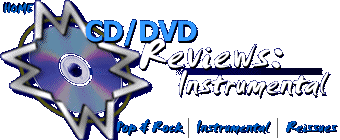








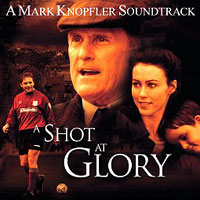 U.K.
guitarist Mark Knopfler is well known for his excellent soundtrack
recordings (Local Hero and Cal) and his trendsetting late
‘70s and ‘80s albums with Dire Straits. In early 2002,
Warner Bros. released the Knopfler soundtrack to the movie
U.K.
guitarist Mark Knopfler is well known for his excellent soundtrack
recordings (Local Hero and Cal) and his trendsetting late
‘70s and ‘80s albums with Dire Straits. In early 2002,
Warner Bros. released the Knopfler soundtrack to the movie 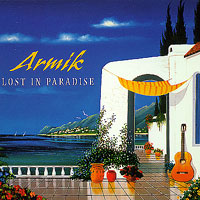 At age seven he pawned his watch for a classical guitar
and by the age of twelve, guitarist Armik was already a professional
recording musician. For the next ten years of his life he played jazz
although early in his life, as he explains, “When I first touched
a flamenco guitar and heard the sound, I realized I could talk through
my instrument.” Following his move to L.A. in 1981, Armik started
releasing a number of solo guitar albums which—since his 94’
debut Rain Dancer—have gone on to define what he
calls “Latin-gypsy-jazz”, also known as the nouveau flamenco
guitar sound. Drawing on both jazz and flamenco guitar styles, Armik
continues mixing a variety of rumba, cha-cha, bolero, jazz and bossa
nova sounds on his latest CD and first for the L.A.-based Bolero
/ Paras Group. Much like the serene, sunny cover artwork for Lost
In Paradise, the music is elegantly recorded and the overall uplifting
spirit of the album makes it the perfect showcase for Armik’s guitar
virtuosity.
At age seven he pawned his watch for a classical guitar
and by the age of twelve, guitarist Armik was already a professional
recording musician. For the next ten years of his life he played jazz
although early in his life, as he explains, “When I first touched
a flamenco guitar and heard the sound, I realized I could talk through
my instrument.” Following his move to L.A. in 1981, Armik started
releasing a number of solo guitar albums which—since his 94’
debut Rain Dancer—have gone on to define what he
calls “Latin-gypsy-jazz”, also known as the nouveau flamenco
guitar sound. Drawing on both jazz and flamenco guitar styles, Armik
continues mixing a variety of rumba, cha-cha, bolero, jazz and bossa
nova sounds on his latest CD and first for the L.A.-based Bolero
/ Paras Group. Much like the serene, sunny cover artwork for Lost
In Paradise, the music is elegantly recorded and the overall uplifting
spirit of the album makes it the perfect showcase for Armik’s guitar
virtuosity. 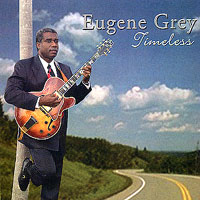 He’s performed with music greats like Kid Creole & The Coconuts,
Big Youth, Burning Spear and The Wailers and now Jamaica-born / South
Florida-based guitarist Eugene Grey returns with his third solo
album, Timeless. Grey’s background as an electric guitar
ace is pretty extensive and on his 2002 instrumental CD, Timeless,
he also plays bass, keyboards and drums. He’s been compared to
guitar legends such as Wes Montgomery and Ernest Ranglin and on Timeless
Grey combines his love of tropical-flavored Reggae and smooth jazz with
a fondness for melodic pop music. Supported by a number of gifted players,
Grey’s breezy guitar floats along on a wave of graceful instrumental
stylings, some featuring effectively placed female back-up vocals. Grey’s
choice of covers—including the Blood, Sweat & Tears classic
“Spinning Wheel”, “Everything I Own” and “Wichita
Lineman”—are also tastefully performed. Filled with good vibes
and light-hearted musical fun, Timeless is a great album to kick
back and relax with.
He’s performed with music greats like Kid Creole & The Coconuts,
Big Youth, Burning Spear and The Wailers and now Jamaica-born / South
Florida-based guitarist Eugene Grey returns with his third solo
album, Timeless. Grey’s background as an electric guitar
ace is pretty extensive and on his 2002 instrumental CD, Timeless,
he also plays bass, keyboards and drums. He’s been compared to
guitar legends such as Wes Montgomery and Ernest Ranglin and on Timeless
Grey combines his love of tropical-flavored Reggae and smooth jazz with
a fondness for melodic pop music. Supported by a number of gifted players,
Grey’s breezy guitar floats along on a wave of graceful instrumental
stylings, some featuring effectively placed female back-up vocals. Grey’s
choice of covers—including the Blood, Sweat & Tears classic
“Spinning Wheel”, “Everything I Own” and “Wichita
Lineman”—are also tastefully performed. Filled with good vibes
and light-hearted musical fun, Timeless is a great album to kick
back and relax with.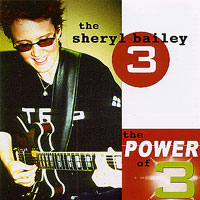 NYC
jazz guitarist Sheryl Bailey continues to rock the Big Apple with the
release of her 2002 CD The Power Of 3 released on Pure Music
Records Like her last group outing, Reunion Of Souls, The Power
Of 3 is a hot jazz date with Bailey superbly backed up by Gary
Versace (Hammond B3) and Ian Froman (drums). Bailey proves
she has her guitar skills down and—attesting to the white hot interplay
between her electric guitar and Versace’s B-3 organ—in the
liner notes she cites numerous jazz-based guitar-organ influences—such
as Jimmy Smith and Wes Montgomery and John Abercrombie and Jan Hammer.
Recorded in the aftermath of the 9/11 tragedy The Power Of 3 is
Bailey’s best studio jazz album yet.
NYC
jazz guitarist Sheryl Bailey continues to rock the Big Apple with the
release of her 2002 CD The Power Of 3 released on Pure Music
Records Like her last group outing, Reunion Of Souls, The Power
Of 3 is a hot jazz date with Bailey superbly backed up by Gary
Versace (Hammond B3) and Ian Froman (drums). Bailey proves
she has her guitar skills down and—attesting to the white hot interplay
between her electric guitar and Versace’s B-3 organ—in the
liner notes she cites numerous jazz-based guitar-organ influences—such
as Jimmy Smith and Wes Montgomery and John Abercrombie and Jan Hammer.
Recorded in the aftermath of the 9/11 tragedy The Power Of 3 is
Bailey’s best studio jazz album yet.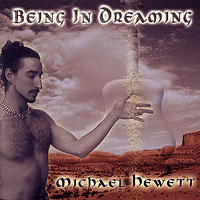 One
of the inspiring alternative/New Age jazz artists on the NYC-based Dharma
Moon label, the latest CD from NYC guitarist Michael Hewett blends
the alternative cool of progressive acoustic jazz with the headphone
aura of say a Pink Floyd album. Hewett makes his music as an outgrowth
of his love of guitar and yoga. The two combined make for a divine listening
experience that’s as diverse as it is rewarding. Hewett sounds
influenced by both the American fusion sound of Pat Metheny and Leo
Kottke with the progressive neoclassical stylings of Steve Hackett.
With Being In Dreaming Hewett carves a fine new niche for modern
acoustic/electric instrumental guitar performance.
One
of the inspiring alternative/New Age jazz artists on the NYC-based Dharma
Moon label, the latest CD from NYC guitarist Michael Hewett blends
the alternative cool of progressive acoustic jazz with the headphone
aura of say a Pink Floyd album. Hewett makes his music as an outgrowth
of his love of guitar and yoga. The two combined make for a divine listening
experience that’s as diverse as it is rewarding. Hewett sounds
influenced by both the American fusion sound of Pat Metheny and Leo
Kottke with the progressive neoclassical stylings of Steve Hackett.
With Being In Dreaming Hewett carves a fine new niche for modern
acoustic/electric instrumental guitar performance.  Guitarist
Guitarist